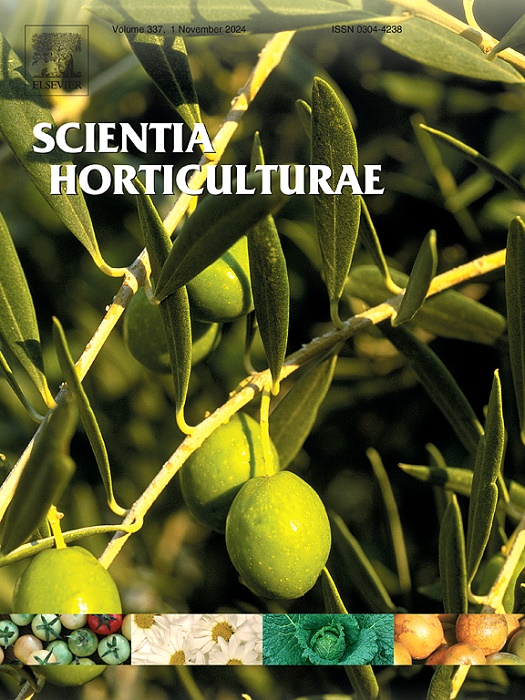Evaluation of phlorizin stress resistance and mineral nutrient utilization efficiency in apple seedlings with different dwarfing interstocks
IF 3.9
2区 农林科学
Q1 HORTICULTURE
引用次数: 0
Abstract
Excessive accumulation of phlorizin in soil is one of the main causes of apple replanting disease (ARD). This study evaluated the effects of phlorizin stress on apple seedlings grafted with three dwarfing interstocks [Jizhen 1 (J1), Jizhen 2 (J2), and SH40]. Phlorizin stress increased relative electrolyte leakage, caused reactive oxygen species and malondialdehyde accumulation, and significantly reduced chlorophyll content, photosynthesis rates, and nutrient absorption, accumulation, and transport, inhibiting apple tree growth regardless of the interstock. Antioxidant enzyme activity was significantly affected in each rootstock/interstock/scion combination under phlorizin stress; however, apple seedlings maintained higher antioxidant enzyme activity levels when J1 was used as the interstock. Principal component and membership function analyses showed that compared to the other interstocks, J1 conferred stronger resistance and mineral nutrient utilization efficiency for apple trees to cope with phlorizin stress. These results highlight the phlorizin resistance and nutrient utilization efficiency of different interstocks under phlorizin stress and provide new insights into the breeding of ARD-resistant rootstock.
不同矮化砧间苹果幼苗间霉素抗逆性及矿质养分利用效率评价
根瘤素在土壤中的过量积累是导致苹果再植病的主要原因之一。本研究评价了根霉素胁迫对嫁接3个矮化中间砧[稷镇1号(J1)、稷镇2号(J2)和SH40]的苹果幼苗的影响。根霉素胁迫增加了相对电解质泄漏,引起活性氧和丙二醛积累,显著降低了叶绿素含量、光合速率和养分吸收、积累和运输,抑制了果树的生长。根际间/接穗组合抗氧化酶活性在根际/接穗组合中受到显著影响;而J1作为中间砧木时,苹果幼苗的抗氧化酶活性保持较高水平。主成分分析和隶属函数分析表明,与其他中间砧木相比,J1具有更强的抗霉素胁迫能力和矿质养分利用效率。这些结果揭示了不同砧木间在根际霉素胁迫下对根际霉素的抗性和养分利用效率,为抗病砧木的选育提供了新的思路。
本文章由计算机程序翻译,如有差异,请以英文原文为准。
求助全文
约1分钟内获得全文
求助全文
来源期刊

Scientia Horticulturae
农林科学-园艺
CiteScore
8.60
自引率
4.70%
发文量
796
审稿时长
47 days
期刊介绍:
Scientia Horticulturae is an international journal publishing research related to horticultural crops. Articles in the journal deal with open or protected production of vegetables, fruits, edible fungi and ornamentals under temperate, subtropical and tropical conditions. Papers in related areas (biochemistry, micropropagation, soil science, plant breeding, plant physiology, phytopathology, etc.) are considered, if they contain information of direct significance to horticulture. Papers on the technical aspects of horticulture (engineering, crop processing, storage, transport etc.) are accepted for publication only if they relate directly to the living product. In the case of plantation crops, those yielding a product that may be used fresh (e.g. tropical vegetables, citrus, bananas, and other fruits) will be considered, while those papers describing the processing of the product (e.g. rubber, tobacco, and quinine) will not. The scope of the journal includes all horticultural crops but does not include speciality crops such as, medicinal crops or forestry crops, such as bamboo. Basic molecular studies without any direct application in horticulture will not be considered for this journal.
 求助内容:
求助内容: 应助结果提醒方式:
应助结果提醒方式:


